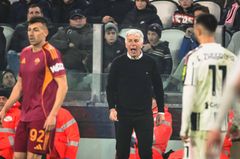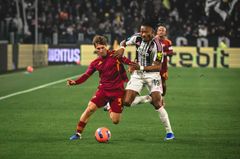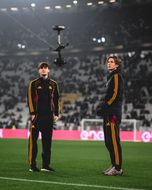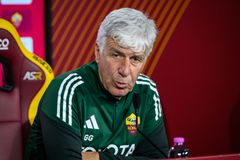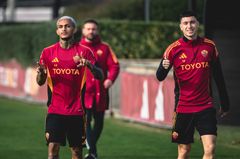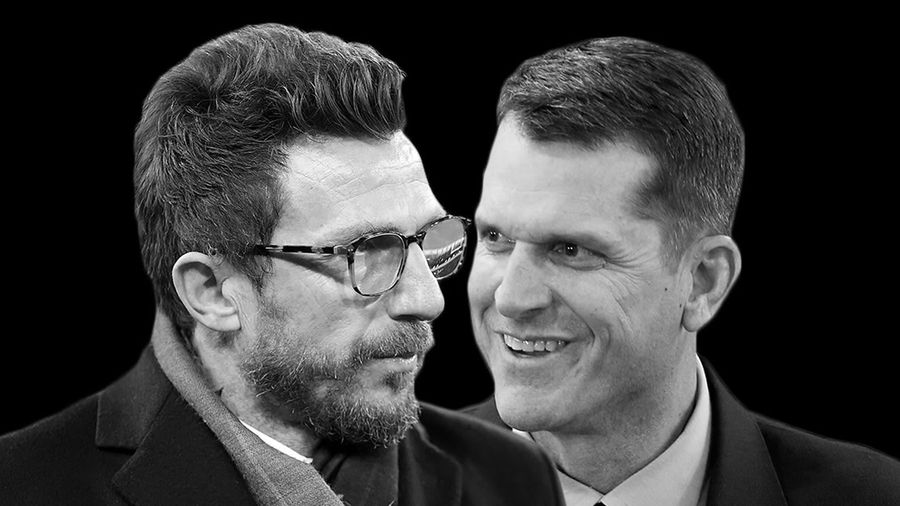
Is it more difficult to motivate players in this day and age with all the distractions of social media?
Eusebio Di Francesco: “We must be good at adapting to new things, different platforms – respecting the new habits of young players. The world has changed, there are many social outlets and it’s right that we too are adaptable to that.
Jim Harbaugh: “I don't think social media has anything to do with it. I set high expectations. I set their goals so high so that somebody has to laugh at their goals. If nobody laughs at your goals then you haven't set your goals high enough. You've got to give them tools to succeed because if left to themselves, without being pushed or being disciplined, then it’s very easy to quit.”
Do coaches now have to adapt their motivational methods more often than they used to?
Di Francesco: “Yes, and it has to be like this – we have to be able to evaluate every type of situation and react, to try and motivate the guys and all athletes in new ways.”
Do you take an interest in the techniques of other coaches in other sports or professions?
Harbaugh: “I look for tips all the time. My brother in-law is a basketball coach, my brother John is a football coach and I talk to them always to try to learn. When it comes to other coaches I know, I'll pick up the phone and ask them if there's anything they're doing that’s new and with the ones I don't know, I try to research and learn what they're doing to be successful.”
Di Francesco: “Particularly when it comes to managing the overall group dynamic. I do like to see how different people work, but I think often individual coaches have particular skillsets that are suited to their specific sports. If we are speaking at a cultural level, however - for example with a sport like rugby - I think there is a lot to learn from other approaches.”
What is your favourite part of coaching?
Harbaugh: “My favourite part of coaching comes when you've worked with a specific athlete and you have coached them on a technique and they try to duplicate it and they don't get it right. There comes a point when they get it and it just clicks and there's a moment there, when they turn around and look at you - it might have been a day or a week or a month or maybe even a year - but the moment they get it, they'll turn and look at you and you can see it in their eyes. That's my favourite moment of coaching.”
Di Francesco: “To be able to transmit an idea and important life values to others.”
What's the most difficult part of coaching for you?
Di Francesco: “It’s what I have said before, I can try to pass on certain values – but there are guys who will be influenced by families or social media.”
Harbaugh: “In my job, when you're dealing with 120 - 130 players plus 20 to 30 staff members plus their families or their girlfriends or their friends, I know that between the hours of 7am and 7pm, something is going to happen. So the better that you can anticipate, the better the resolution will be. I have to make battlefield decisions. Sometimes something comes up that makes you say, 'I've never seen that before' and you have to apply a criteria to your decision making and for me, that criteria is three things: What is best for the team? What is best for the individual? What helps us win?”
What current coaches do you admire and why?
Di Francesco: “I like to observe many different approaches, even from coaches I do not necessarily know personally – but I really admire the way Pep Guardiola works.”
Harbaugh: “To be a coach is a great honour. I assume all coaches are in it for the right reasons because they want to teach and they want to develop players. So I give all coaches the benefit of the doubt and feel that their reward will be great in heaven. If it’s proven that a coach isn't in it for the right reasons or he doesn't make decisions that are based on the welfare of the players and the team, then I’ll take them off my list of people I want to be associated with.”
How important is team spirit and building a team as a goal towards success?
Di Francesco: “It’s fundamental; to work together and help each other makes the group stronger in general.”
Harbaugh: “I believe Napoleon Bonaparte is quoted as saying that 'a force that has a high morale of a 100 can defeat a battalion of 300 with low morale’.”
Do players have to get along to succeed on the pitch?
Di Francesco: “It helps, because football is unique in many ways. Creating a rapport that is not solely grounded in a work relationship is vital. I think that knowing each other beyond the work environment, not only in football but in any job, is important to better know a person’s strengths.”
Harbaugh: “They don’t have to get along but you would expect trust being the foundation for any relationship. To be successful, everybody has to trust each other. When you find somebody that’s in it just for themselves or will do anything in an ambitious way to help themselves while hurting a teammate, then they’re no longer a teammate and they have to go.”
Is it difficult to simultaneously coach older veterans and younger kids from completely different generations in the same team?
Harbaugh: “In my life I find it a real positive to have a wide range of multigenerational friendships - a best friend that can be 80 years old and one that can be 18. They see things differently and you can learn so much from them.”
Di Francesco: “Initially, yes - the important thing is to work out a system and right approach so everyone can work together. Cultures and religions can be very different across the group and we have to be prepared for this.”
How much time can you take off during the year, meaning days when you’re completely removed from your job?
Di Francesco: “My 15 days of holiday in the summer are absolutely vital, as much – if not more - for the physical aspect than for the mental one.”
Harbaugh: “I don’t know the answer to that. My wife once joked that they pay you so much money that you should be working every minute of the day. You should even be dreaming about football when you’re sleeping.”
Last question, when scouting a player, regardless of position, what is the number one thing you look for?
Di Francesco: “Initially the first thing we look at in a player is his technical, tactical and physical qualities – then after that I am very interested in the player as a person. The quality of the man can make a big difference regardless of his talent.”
Harbaugh: “That there’s a toughness about them and they love what they’re doing - so if it’s playing rugby or soccer or football or basketball, they love it so much that they’ve got to do it every day.”

 Tickets
Tickets
 Shop
Shop




































